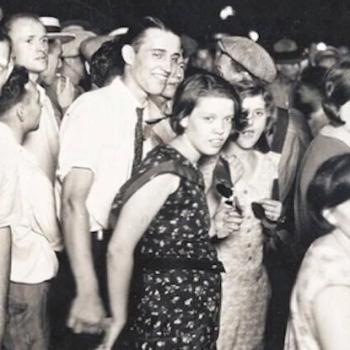Deuteronomy 23:2-9 deals with "G-d's congregation" and who can become a member, essentially a convert. It says that a man who was unable to conceive (it says whose testes were crushed or penis cut off), any illegitimate child, anyone within ten generations of an illegitimate child, any Ammonite or Moabite, or any descendant of an Ammonite or Moabite within ten generations were forbidden from becoming Israelites. Not only that, but we were not to concern ourselves with the Ammonites' or Moabites' welfare. Why? Because they did not assist the Israelites after they fled Egypt and they hired Balaam to curse them. Interestingly, there were no such prohibitions on the Edomites or Egyptians as the Edomites were considered family and we were strangers in the land of Egypt.
As with any large group of people, hygiene is an issue. Here the Torah deals with hygiene in their camps. If a man had a "nocturnal emission" he had to leave camp and bathe. Also, the camp had to dig latrines outside of the camp area and cover the results. While many people of ages past did not understand the need for hygiene, the Israelites clearly did.
Remember when I said (way back at the beginning) that this portion contains 74 of the 613 mitzvot? Well, the end of this parsha becomes a list of mitzvahs. Ready?
- If a slave ran away and found refuge with the Israelites, they were not allowed to turn him over to his master. (The Confederates might not have appreciated that one.)
- Israelites are forbidden from being whores, sodomites, or prostitutes and any money earned as such could not be used to fulfill any mitzvah or sacrifice.
- Israelites are forbidden from charging interest on loans to countrymen but could charge interest to others. Interesting tip (pun intended) -- there are still Jewish groups that offer interest free loans to Jews in the U.S.
- Any vow made to G-d was to be promptly fulfilled but there was no punishment for not making a vow.
- A visiting Israelite could enter an Israelite's vineyard and eat until full but could not take any with him. Also, he could eat any standing grain in a field plucked by hand but could not cut it with a sickle.
- A divorced woman could not remarry her first husband if she had married again in between.
- A man who was newlywed was exempt from military duty for a year to give happiness to his wife. (And it is still true in Israel today.)
- Israelites are forbidden from taking a work implement for pawn that would be equivalent to taking their livelihood.
- If one kidnapped a fellow Israelite, they were to die.
- If an Israelite had a skin issue, they were to follow the priests' instructions, remembering that G-d afflicted and healed Miriam's skin.
- If an Israelite lent to another, he was forbidden to enter the borrower's house to claim his property. He had to wait outside. If the borrower was disadvantaged, the lender had to return the collateral every night and retrieve it every morning.
- Israelites are forbidden to abuse a needy or poor laborer (no matter if they are an Israelite or stranger), and they had to pay the wages on the same day as the work as the laborer depended on that wage.
- A parent was not to be put to death for their children, nor a child for his parents. A person could only be put to death for a crime they committed.
- The Israelites had to protect the rights of the stranger, orphan, and widow. They could not take a widow's garment as pawn and are to remember that we were all strangers in the land of Egypt.
- If a sheaf of grain was accidentally left in the field, they were to leave it for the stranger, orphan, and widow. The same goes for vineyards, olive trees, and other orchards.
- If you had to be flogged, the magistrate would have you lay down and whipped in his presence but not for more than 40 lashes as that would be embarrassing and degrading.
- You could not muzzle your ox while you beat or threshed your grain as it would tease the ox with the food.
- If brothers lived together and one died without a son, the other brother was to marry the widow and have children. The first son was to "count" to the other brother and his name would live on. If the brother didn't want to do this duty the woman would stand at the gate, announce that he would not perform the levir's duty. Then, if he could not be convinced otherwise, she would pull off his sandal, spit in his face, and say, "Thus shall be done to the man who will not build up his brother's house."
- If two men fought and a woman came between them to save her husband and grabbed his genitals, her hand was to be cut off.
- All Israelites must be completely honest with their weights and measures and may not have a second set to confuse.
- Israelites had to remember what the Amalekites did to them after they left Egypt. They surprised them and killed the people at the rear. They must never forget this act.





